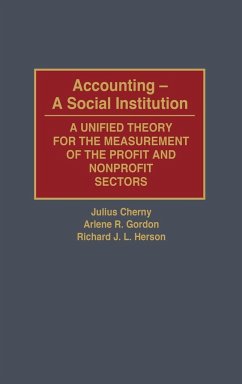This book attempts what for many in the accounting profession has been the impossible: a unified accounting system for measuring and reporting the performance of human service organizations as well as firms in the profit sector. The model developed recognizes the centrality of the consumer and the significance of optimizing consumer preferences whether the consumer is an individual purchasing services and products in the profit sector or the consumer is society in the role of consumer-payer of the services and products of human service organizations. Equating society as the consumer-payer of human services leads to the use of societal income as a measure of the effectiveness of human service organizations. Accounting is a social institution whose chief function is measurement. Given a statement of goals, accounting should measure the achievement of these goals. Thus accounting can be viewed as a feedback system to report the differences between goals and their achievement. In a democratic society, the economic goal for its members should be their continuing gains in independence from a self-sufficiency viewpoint and satisfaction of their needs and wants from a consumption viewpoint. These are common goals in the profit and nonprofit sectors. The societal model developed by Herson, Gordon, and Cherny has long-run implications for the professions of accounting, human services, economics, and political science and the book will be a provocative work for professionals in these disciplines for some time to come.
Hinweis: Dieser Artikel kann nur an eine deutsche Lieferadresse ausgeliefert werden.
Hinweis: Dieser Artikel kann nur an eine deutsche Lieferadresse ausgeliefert werden.








